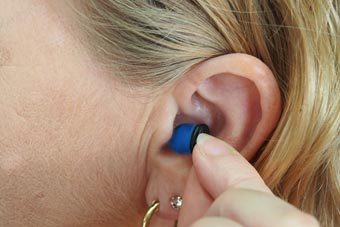Tinnitus is a medical condition that’s generally described as ringing in the ears. However, you could hear other sounds like clicking, humming, roaring, or buzzing.
For some people, tinnitus comes and goes. But for other people, it can last for days or hours on end. No matter how long it lasts, tinnitus can be a huge disruption to your everyday life, making it difficult to sleep or concentrate.
Even though tinnitus has no cure in some cases, a number of treatments, such as acupuncture, can help alleviate and resolve the condition.
Continue reading to learn more about acupuncture benefits for tinnitus.
Acupuncture Benefits for Tinnitus
Acupuncture can reduce symptoms of tinnitus in certain cases. Several studies have looked at acupuncture as a treatment for tinnitus, and many recent ones suggest acupuncture might decrease the intensity of tinnitus, improving the quality of life.
A study conducted in 2011 evaluated the therapeutic effects of acupuncture on the inner ear originated tinnitus. The study had 54 participants divided equally into the acupuncture group and the control group. The acupuncture group was treated with effective acupuncture with actual acupuncture needles, whereas the control group was treated with the normal acupuncture method but with fake needles.
After the 5th and 10th treatment sessions, the mean of tinnitus severity index decreased significantly in the acupuncture group. Moreover, there were also improvements in the quality of life of the acupuncture group. Thus, the study concluded that acupuncture could improve tinnitus in some selected patients.
Another study conducted in 2018 evaluated the impact of tinnitus on chronic non-pulsatile tinnitus. Patients experiencing chronic non-pulsatile tinnitus were randomly divided into two groups – acupuncture and control. They were treated in 15 sessions, and at the end of the 15th session, tinnitus severity index and visual analog scale for tinnitus loudness were completed.
The results revealed that the visual analog scale and tinnitus severity index was much lower than the control group in almost every session. Hence, the study concluded that acupuncture is effective in decreasing the severity and loudness of tinnitus and can be a successful treatment for non pulsatile chronic tinnitus.
Lastly, a 2016 study aimed at a systematic review and meta-analysis of all available randomized controlled trials using acupuncture to treat tinnitus. The results of the review suggested that acupuncture therapy might offer subjective benefits to certain tinnitus patients.
What Is Tinnitus?
Tinnitus, or ringing in the ears, is the sensation of hearing buzzing, ringing, whistling, hissing, chirping, or other sounds. The noise can be either be intermittent or continuous and can differ in loudness. It is typically worse when the background noise is low. Thus, you might be most aware of it at night when you are trying to sleep.
Tinnitus is quite common in the US as it affects almost 50 million Americans. For many individuals, the condition is just an annoyance. However, in severe cases, tinnitus can cause people to experience difficulty in sleeping and concentrating. It might eventually start interfering with personal relationships and work, resulting in psychological distress.
Even though tinnitus is usually associated with hearing loss, it doesn’t cause the loss. Similarly, a hearing loss doesn’t lead to tinnitus. As a matter of fact, certain people suffering from tinnitus don’t experience any problem in hearing, and in some cases, they even become so highly sensitive to sound that they have to take steps to mask or muffle external noises.
Symptoms of Tinnitus
Tinnitus is mostly described as a ringing in the ears, even though there is no external sound. Nevertheless, as mentioned above, tinnitus can also lead to other kinds of phantom noises in your ears, such as:
- Roaring
- Buzzing
- Clicking
- Hissing
- Humming
Most individuals suffering from tinnitus have subjective tinnitus. This means that only they can hear the sounds. The noises of tinnitus might vary in pitch from a low roar to a high squeal. You might hear the sound in either one or both ears.
Causes
The most common cause of tinnitus is prolonged exposure to loud sounds. This can damage the sound-sensitive cells present in the cochlea, an organ in the inner ear.
A number of other illnesses and conditions can result in tinnitus, such as:
- Blockages in the ear due to wax buildup, ear infection, or in some cases, a benign tumor of the nerve
- Jaw or neck problems
- Meniere’s disease that affects the inner part of the ear
- Neck and head injuries
- Other medical conditions like cardiovascular disease, high blood pressure, anemia, circulatory problems, autoimmune disease, allergies, diabetes, and an underactive thyroid gland.
- Otosclerosis, a disease that leads to stiffening of the small bones in the middle ear
- Some drugs – most commonly aspirin, certain kinds of antidepressants, antibiotics, loop diuretics, antiinflammatories, and quinine medications; tinnitus is considered to be a possible side effect for nearly 200 non-prescription and prescription drugs.
- The natural aging process, which can cause the cochlea or other parts of the ear to deteriorate.
Tinnitus can intensify in certain people if they smoke cigarettes, drink alcohol, eat particular foods, or drink caffeinated beverages. There is some evidence that fatigue and stress can also aggravate tinnitus.
Last Few Words
If a ringing sound in your ears is bothering you and preventing you from sleeping properly on concentrating on tasks, you should definitely look into acupuncture.
At the American College of Acupuncture & Oriental Medicine (ACAOM) Main Clinic, we offer acupuncture treatment to help you overcome the condition. Book a consultation appointment at 713-780-9786 or our outreach at Houston Methodist Hospital Wellness Services at 713-441-5980.
 Our Degree Programs
Our Degree Programs